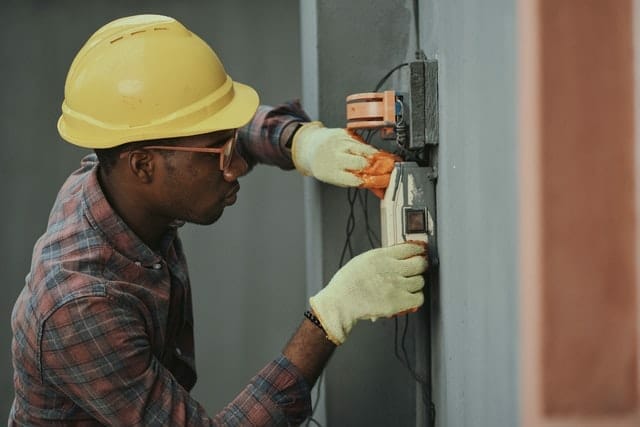Electricians Insurance: Everything You Need to Know
Being an electrician is a lucrative job as people depend on them to keep their lights and power on in their homes. But this is not an easy job. Electricians spend their days installing and repairing all kinds of electrical devices in various environments, including buildings, residential homes, shops, and offices.
Electricians need the right coverage that will help them in case of an accident. Here’s everything you need to know about electricians’ insurance.

What Type of Insurance Do Electricians Need?
Whether you are a self-employed contractor or you run a small business, there are several types of insurance for electricians you may need:
General Liability Insurance
General liability insurance is a great option for electricians because it covers them in many situations, from a client breaking an arm after tripping over the toolbox to one of your workers accidentally damaging the client’s property.
Professional Liability Insurance
Professional liability insurance protects the business from legal claims that the general liability policy doesn’t cover. For example, suppose an unsatisfied client decides to sue you after hiring another company to correct your mistakes. In that case, professional liability insurance will cover legal fees, court costs, and compensations if you are found at fault.
Workers’ Compensation Insurance
This type of policy is a requirement in most states. Even if you only have one employee, you could be fined if you don’t have workers’ comp insurance in place. However, even if your state doesn’t require this policy, it is recommended to have it as it protects business owners from the costs of workplace injuries.
Equipment Insurance
Any electrician who owns electrical tools and types of equipment should think about protecting them with equipment insurance. Many tools get lost, stolen, or damaged, so it’s a good idea to cover them instead of buying new tools.
Cyber Insurance
It may come as a surprise to some, but more and more electricians need cyber insurance these days. If you own a website or you transfer money online, you should think about buying this policy because cybercriminals are getting smarter and more present everywhere.
Should an Electrician be Insured?
Yes, electricians should prioritize having insurance coverage, particularly liability insurance, given the nature of their profession:
Risk of Accidents and Property Damage:
- Electricians work with potentially hazardous materials and equipment on a daily basis. Even with stringent safety protocols in place, accidents can still occur. For instance, an electrician might inadvertently damage a client’s property while installing wiring or repairing electrical systems. Without liability insurance, the electrician could be held financially responsible for the cost of repairs or replacement, which could be significant and potentially jeopardize their business’s financial stability.
Protection Against Lawsuits:
- In the event of an accident or property damage caused by the electrician’s work, clients may file lawsuits seeking compensation for their losses. Legal fees and court costs associated with defending against these lawsuits can quickly add up, even if the electrician is ultimately found not to be at fault. Liability insurance provides coverage for legal defense costs as well as any settlements or judgments awarded to the plaintiff, thereby shielding the electrician from the potentially ruinous financial consequences of litigation.
Client Expectations and Industry Standards:
- In many cases, clients expect electricians to carry insurance as a standard practice. Having insurance coverage demonstrates professionalism and a commitment to accountability and reliability. Moreover, in some industries or regions, insurance coverage may be a requirement for obtaining contracts or permits. By maintaining adequate insurance coverage, electricians can enhance their credibility and competitiveness in the marketplace while also complying with industry standards and regulatory requirements.
Peace of Mind:
- Running a business comes with inherent risks and uncertainties. Having insurance coverage provides electricians with peace of mind knowing that they are financially protected against unforeseen events that could potentially disrupt their business operations or personal finances. This peace of mind allows electricians to focus on their work with confidence and assurance, rather than worrying about the potential financial repercussions of accidents or legal claims.
Safeguarding Personal Assets:
- Without liability insurance, electricians risk exposing their personal assets, such as savings, property, and investments, to seizure or liquidation in the event of a lawsuit or judgment against their business. Liability insurance helps shield personal assets from such liabilities, preserving the electrician’s financial security and mitigating the risk of personal bankruptcy or financial ruin.
In conclusion, while insurance is an additional expense for electricians, it is an essential investment in protecting their business, reputation, and financial well-being. Liability insurance, in particular, serves as a critical safeguard against the myriad risks and liabilities inherent in the electrical contracting profession, providing peace of mind and financial security to electricians and their clients alike. Therefore, electricians should prioritize obtaining adequate insurance coverage as a fundamental aspect of their business operations.
Do Self-Employed Electricians Need Insurance?
Self-employed electricians, like any other business owners, need insurance to safeguard their livelihoods and protect themselves against the financial risks associated with their profession. While some may assume that insurance is only essential for larger companies or those with employees, the reality is that self-employed electricians face many of the same risks and liabilities as their counterparts.
Firstly, accidents can happen in any line of work, and the electrical industry is no exception. Whether it’s a minor mishap or a major incident resulting in property damage or bodily injury, self-employed electricians can be held liable for the consequences. Without insurance, they may be personally responsible for covering the costs of medical bills, repairs, or legal fees, which could potentially drain their savings or even lead to bankruptcy.
Moreover, insurance provides self-employed electricians with a layer of professional credibility and reassurance for their clients. By demonstrating that they are adequately insured, self-employed electricians can instill confidence in potential customers and differentiate themselves from competitors who may lack insurance coverage.
Additionally, insurance can help self-employed electricians navigate the complexities of contracts and project requirements. Many clients, especially larger corporations or government entities, may stipulate certain insurance requirements as a condition of doing business. By having the appropriate insurance policies in place, self-employed electricians can avoid missing out on valuable opportunities and ensure compliance with contractual obligations.
Is Electricians Insurance Required?
Electricians’ insurance requirements vary from state to state. For example, in California, electricians must obtain a license, and before they apply, they must hold at least four years of experience at a journeyman level to bid on any projects worth $500 or more. Despite different regulations, most states require workers’ compensation insurance.
How Much Does Electricians Insurance Cost?
Typically, the median price of a general liability policy is $540 per year, while the median price of workers’ comp insurance is under $3,275 per year, depending on the state. Furthermore, commercial auto insurance’s median cost per year is around \$1,700, and \$1,060 for professional liability insurance.
The cost of these policies depends on a few factors, including:
- The size of the business
- Gross income
- Location
- Number of employees
What Insurance Covers Electricians?
There are several types of policies that cover claims your business caused property damages or bodily injuries to someone else. These policies include general liability insurance, professional liability insurance, workers’ comp insurance, and equipment insurance.
Do Electrical Contractors Need Professional Indemnity Insurance?
Although not legally required, professional indemnity insurance is important to consider because it is designed to protect you and your business in case you are subjected to claims of poor workmanship.














